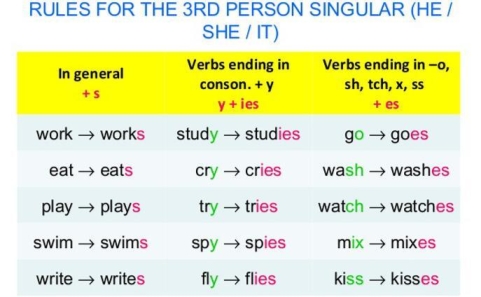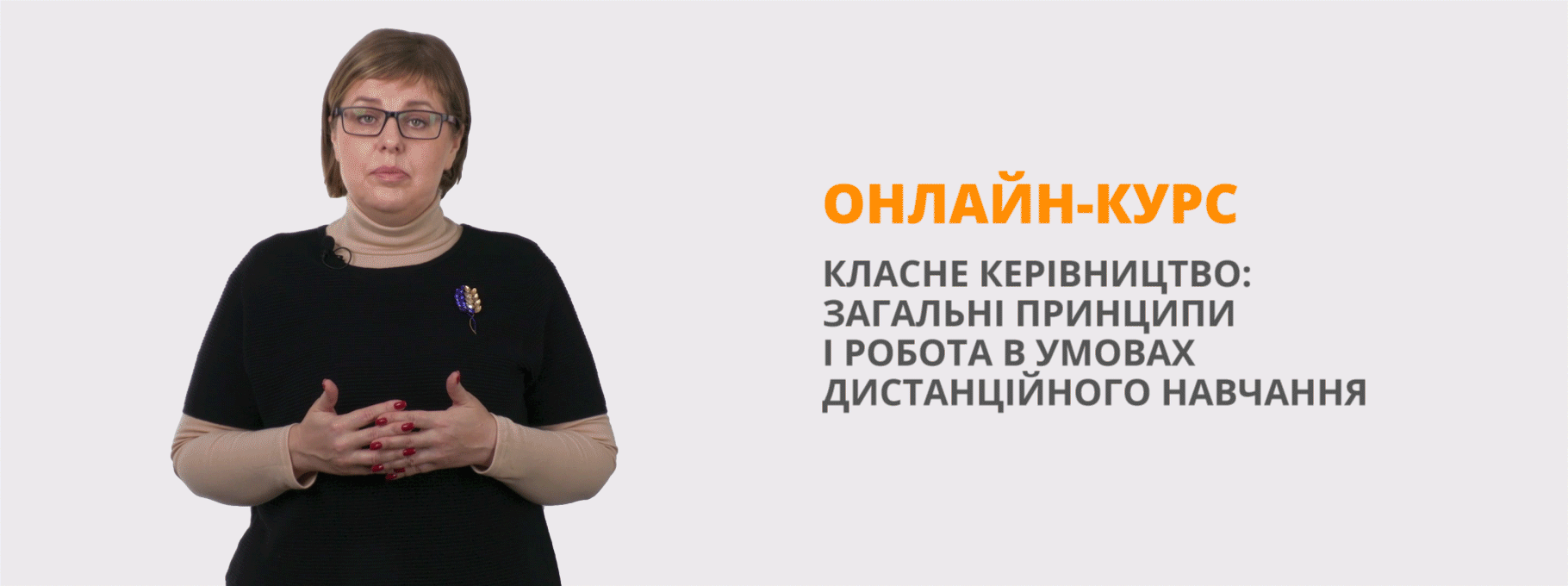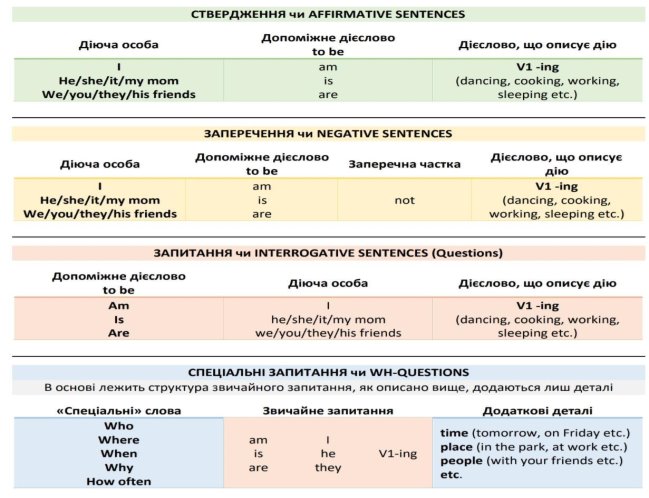Матеріали до уроку англійської мови ,розробки завдань Present Simple/Present Continuous
Present Simple Tense
Стверджувальне речення в Present Simple (Present Indefinite) утворюється за
допомогою підмета (хто? що?) та присудка (здебільшого він виражається
смисловим дієсловом в першій формі).
I study French. Я вчу французьку мову.
You speak English. Ти розмовляєш англійською.
Якщо підмет виражений іменником або займенником в третій особі однини,
тоді до дієслова додається закінчення -s або es.
She speaks English. Вона розмовляє англійською.
He plays the violin. Він грає на скрипці.

Для заперечного речення існують два допоміжних дієслова: do – для
I/we/you/they та does – для he/she/it до яких додається частка not.
I like
I do not(don’t) like
He does
He does not (doesn’t) do
Для побудови питального речення також використовуються допоміжні
дієслова do та does, яке в реченні зазвичай має стояти напочатку. Лише у
випадках, коли є питальні слова (наприклад, Why – чому, How often –
як часто, What – що, How much – як багато), то слова do/does в реченні стоять
одразу після них.
1. Change the verb into the correct form:
1. London (be) in England.
2. The summer (be) hot.
3. She (drive) very well.
4.They (open) the store at 8:00.
5. Linda (be) a very pretty girl.
6. I (have) several jobs.
7. Water(boil) at 100 degrees.
8. Water(freeze) at 0 degrees.
9. My sister (speak) English.
10. He (have) a big apartment.
11. A triangle (have) three corners.
12. My birthday (be) in June.
13. Books (have) pages.
14. Dogs (be) good friends.
15. I (work) hard.
2. Change the verb into the correct form:
1. I (love) you.
2. This (weigh) 20 kilograms.
3. Ron (seem) serious.
4. We (like) tomatoes.
5. The boy (want) to play.
6. You (need) to sleep.
7. They (agree) with me.
8. She (hear) something strange.
9. The box(contain) food.
10. Emma (appear) sad.
11. David (know) how to fix a car.
12. Daniel and Liz (seem) happy.
13. This (smell) bad.
14. I (believe) you.
15. We (be) number one!
3. Change the verb into the correct form:
1. I (not ride) horses.
2. You (not sell) cars.
3. He (not bring) gifts.
4. She (not take) pictures.
5. It (not cost) so much.
6. We (not seem) so happy.
7. They (not buy) new products.
8. Michael (not dance).
9. Michel (not run) fast.
10. Tim and Kate (not work) every day.
11. Lucas and Clara (not eat) meat.
12. I (not swim) much.
13. You (not ski) at all.
14. It (not hurt).
15. We (not give up).
Present Continuous
1. Complete the sentences.
1. You (use) my mobile phone!
2. My dad (wash) his car.
3. It (not rain) today.
4. Who she (chat) to now?
5. What you (do) at the moment?
6. We (sit) on the train.
7. The students (have) lunch in the canteen.
2. Fill in the verbs in brackets in Present Continuous or Present Simple. Do not use contractions in this exercise.
1. What is he doing? He at his desk. (sit)
2. Listen, someone at the door. (knock)
3. On my way home I usually to drink a cup of coffee. (stop)
4. Architects plans of the buildings. (make)
5. Look at Betty: she the piano. (play)
6. At this moment I my pupil’s exercises. (correct)
7. Where are you? I my lessons in the study. (prepare)
8. She a lot of money. (earn)
9. Chris near the table. (stand)
10. We often tea for breakfast. (take)
11. William to our workshop on Mondays. (come)
12. Let’s wait a moment . Tom soon. (come)
13. I must run home, mother for me. (wait)
14. The telephone often during supper. (ring)
15. Stephen a cigarette now. (smoke)
16. It hard at the moment. (snow)
17. I always to my office early. (go)
18. Two and two four. (make)
19. What are you doing here? I for my book. (look)
20. It in autumn. (rain)
21. Look, a man across the street. (run)
22. Listen: Sting! (sing)
23. Henry`s letters by air mail. (come)
24. We many roads nowadays. (build)


про публікацію авторської розробки
Додати розробку

